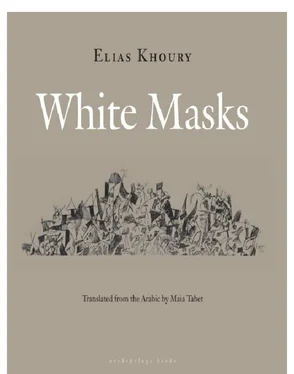“Drink, man,” the officer says.
“Thank you, I don’t drink coffee.”
“You’re stubborn, aren’t you?”
“I am.”
“Listen to me,” the officer says, rising. “A softly-softly approach is useless with you people. But let me tell you that it is within our power to break you. We can put you through hell, if we so wish.”
“You’ve already done it, down in that cell.”
“You think I’m joking?”
“No, I think there isn’t anything you can do.”
“Listen, we want one thing, and one thing only, from you. . Just a little information on your bases in the South.”
“I know nothing.”
“You mean you won’t talk?”
“I mean I know nothing.”
The officer rings the bell again. Two large, heavily built men enter, muscles bristling. Holding him up by the armpits, they just lift Abu Jassem out of his chair.
“The chicken treatment, Sir…?”
They took him out of the room and led him to a kind of elevated scaffold, where prisoners were suspended by their hands and feet, like a chicken on a rotisserie spit; after a few moments, they brought him back into the room.
“Looks like nothing works with you,” the officer said.
“You’ve used every method you have, and I still know nothing.”
The officer’s voice softened.
“You’re young and healthy, why waste your youth like this?. . You’re all traitors, you’re a. . you’re nothing but collaborators.”
“You must be mistaken, Sir. It is you who are the collaborators and the agents.”
The officer got up and slapped him. Facing him squarely, the feda’i Sameer Amro spat in the officer’s face. The officer wiped off the spit with a tissue and barked an order to the two strongmen to give him the “spit,” which they did.
During the next and final interrogation session, the officer said what he had to say in a couple of sentences. “Be informed,” he told Sameer as he led him to his cell, “that you shall spend the rest of your days here. Your people have split up, and every government in the Arab world is accusing them of treason.” Sameer Amro remained in that cell until the June 1967 war. When he was released, he went straight back to al-Hama camp and laid low for a while.
Stories abound of his courageous exploits inside the Occupied Territories. According to one of many such accounts, he single-handedly put an Israeli tank out of commission with an RPG missile.
Abu Jassem is now the cadre in charge of the party office where Fahd Badreddin “works,” and he is the only person who treats Fahd with any respect. He even consults him on occasion. Besides his participation in many leadership organizations, he is responsible for special operations — including, it is rumored, the 1972 Munich Operation (although no one was able to confirm this information); he is a very senior cadre in West Beirut with many duties attached to his position. He remains, however, a man of few words.
Since the outbreak of civil war in Lebanon, Abu Jassem has become rather irascible. During the Battle of the Mountains, he was very vocal about the need for decisiveness, arguing in favor of prosecuting the war to the bitter end, to victory. But, as is well-known, the “decisiveness-in-battle” principle was eschewed in favor of Arab and international intervention — in Abu Jassem’s words, a mere diversionary tactic before the coup de grâce was delivered. Waving his stump in the air, he curses the pass we have come to.
Gradually, and in spite of his reluctance, he was assigned a car, a driver, and then a bodyguard. He didn’t want them, but he was told they were “unavoidable security measures” in the changing situation and that “given the positions of responsibility we are now in, you can’t refuse.” So he agreed. But he agreed reluctantly. He dismissed the driver early as often as he could, and would find some mission or other in the South on which to dispatch his bodyguard, simply in order not to be accompanied.
The captain has not changed much over the years. He’s put on a little weight, maybe, but he remains a solid man. People say he drinks — everybody drinks — but he’s never been on a mission drunk, so it’s not a problem. He is adamant about the subject of border security, because, in his words, there is a very real danger of enemy infiltration. But when it comes to political analysis, he raises his stump in the air as if to say that he knows nothing.
The captain has not enriched himself. That is a fact. Those who have display such ostentation that it cannot pass unnoticed. But he remains unchanged. Although this place is awash with petrodollars, Abu Jassem has lost none of his probity or integrity. Everyone knows that Captain Sameer Amro could have gone the way of many others and filled his pockets, but he obviously has not had that inclination. Or perhaps it’s for some other reason we don’t know about; or even, simply because he has remained faithful to his principles.
When the subject of looting and other abuses is brought up, Abu Jassem is quick to retort that such incidents constitute the exception and not the rule: “These are passing aberrations which will disappear, leaving only the true combatants.”
His role in Khalil Ahmad Jaber’s case is somewhat unclear. Khalil was initially taken in for questioning at the party office when Captain Sameer wasn’t there, and it’s possible he may not even have read the report submitted by his aide, First Lieutenant Salah. But after learning that the victim was the father of the martyr Ahmad Jaber, he went to pay his respects at the home of the deceased. He listened patiently to Khalil’s wife, mobilized his assistants and personally initiated and supervised the inquiry: he had Ali Kalakesh summoned, he interrogated Fatimah Fakhro, he read the coroner’s report closely, and he considered at length the factors which led to Khalil’s detention.
“I said only to arrest him… Why did he die like that?”
They assured him that none of them had been involved in the murder, that they’d released him the same day.
“Then who is the brute that kills a poor tramp for his gold wedding band? Whatever happened to his manhood?”
He told them he suspected them, his very own men. But then he dismissed the thought. It couldn’t have been them — they wouldn’t kill a man for his wedding band. After all the banks that were looted, no one out there would kill a man for a petty little gold band, worth no more than a couple of hundred lira!
Faced with such an impasse, he halted the inquiry and closed the file.
He supervised the funeral arrangements personally, he went to the deceased’s home and let Khalil’s wife know that henceforth her late husband would be considered a martyr. He oversaw the provision of food for the occasion and regularly visited the home of the deceased, and he never tried to obfuscate the fact that Khalil had been arrested for a few hours, on his orders, four days before the body was found. He vowed to lay his hands on the murderers and have them publicly executed.
Abu Jassem took the posters of Khalil Ahmad Jaber to the house in person, and he stood in the reception line alongside the wife and other relatives for the condolences. And when the mourners questioned him on the details of the interrogation, he sipped the bitter coffee placed on the table before him, sucking his lips in noisily and licking off the froth that stuck to them, inhaled deeply on the first drag of his cigarette, and answered with his customary cool-headedness.
“It is clear,” he said, “that we cannot allow our ranks to be infiltrated. What is going on here is a war, not a game. It’s not child’s play. Khalil Ahmad Jaber was detained for security reasons. Are we supposed to let ‘irregularities’ escape our scrutiny? There was this man, whom no one seemed to know, trudging through residential neighborhoods, sleeping on the street and ripping down posters. He may have been booby-trapping cars or placing explosives outside the homes of law-abiding citizens. We had no idea who he was, but when we ascertained his innocence, we let him go…”
Читать дальше












